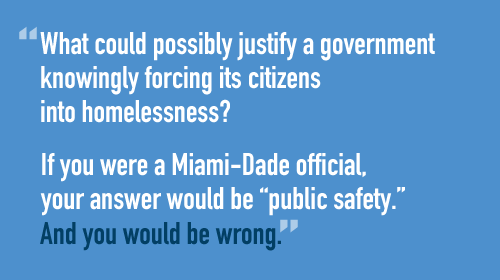
On the outskirts of Florida's Miami-Dade County, dozens of individuals formerly convicted of sexual offenses live as exiles on an abandoned strip of land near a railroad track. The area has no shelter from the elements, no running water, and no bathrooms. The most fortunate inhabitants of this makeshift encampment sleep in cars or in tents. Others make due with a tarp or anything else that passes as cover. Each night brings new threats of violence, malnutrition, and disease.
The images are disturbingly reminiscent of scenes from nearly a decade ago, when a collection of over 100 former sexual offenders formed a similar camp under a bridge spanning . Local officials scattered that Skid Row sometime in 2010, following a barrage of condemnation by the public.
Like the people under the bridge, the people by the tracks did not simply fall into these tragic circumstances. They were shoved.
Miami-Dade County has forced them and hundreds more into homelessness with an ordinance that prohibits those convicted of certain sexual offenses from living within 2,500 feet – nearly half a mile – of a school. The ordinance has kept many of the inhabitants from living with family or loved ones who could offer shelter, and it has made it extraordinarily difficult to find affordable housing in the mostly urban county. More importantly, the ordinance creates the very conditions that undermine its stated rationale of public safety.
The reveal both the senselessness of the ordinance and the arbitrariness of its enforcement. A number of those first exiled to the tracks lived for years in a trailer park named River Park, one of the few locations compliant with the ordinance that offered affordable housing. In May of 2013, officials with – ironically – the Miami-Dade Homeless Trust complained to local law enforcement that former sexual offenders were living within 2,500 feet of a youth emergency shelter called Miami Bridge Youth and Family Services.
Officials hastily resolved to label Miami Bridge a school and then evicted over 50 individuals from River Park under the ordinance. Their decision came despite the facts that for 25 years Miami-Dade had never classified the shelter as a school, that state law enforcement acknowledged having no trouble with River Park residents, and that a river separates the trailer park from Miami Bridge. As a result of the county's actions, the majority of the evictees became homeless and relocated to the tracks.
The Florida Department of Corrections has since only exacerbated the crisis. Rather than helping people recently released from prison identify housing suitable under the Miami-Dade ordinance, its probation officers instead direct those unable to find housing to the tracks. Many at the tracks tell the same story of this surreal experience.
After learning they had nowhere to live, their probation officers wrote down a street intersection on a piece of paper. The officers instructed them to either go to the location or go back to prison. Arriving at the intersection, the probationers walked around for hours in disbelief. They expected to find some sort of house or building, but eventually grasped the barren truth: They had been sent to live on an empty lot.
What could possibly justify a government knowingly forcing its citizens into homelessness? If you were a Miami-Dade official, your answer would be "public safety." And you would be wrong.
Decades of research – in states as different as , , , , and, yes, – demonstrate that residence restrictions don't work. These laws are meant to keep former offenders away from children, but studies show that, at best, they have and, at worst, they might . The only factors proven to reduce recidivism for this population are —two things that are almost impossible to come by when you're living in a tent by a railroad track.
Because residency restrictions don't protect the public and undermine the only interventions that do, groups like the have disavowed restrictions like the Miami-Dade ordinance for producing a "false sense of security" in the public's mind.
Residency restrictions are not only ineffectual and counterproductive. They are cruel. By depriving people of the fundamental right to personal security and driving them into homelessness, Miami-Dade is violating the Constitution's basic promise of due process. In response, the ACLU and the ACLU of Florida today filed a lawsuit challenging the county's residency restrictions on behalf of three plaintiffs made homeless by this toxic ordinance and the Florida Action Committee, a nonprofit organization that tries to identify housing for those impacted by the ordinance.
The time has come for Miami-Dade County to turn away from this failed public policy.
Learn more about residency restrictions and other civil liberties issues: Sign up for breaking news alerts, , and .


